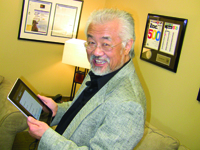The Apple iPad gives physicians a new way to connect to courses, news and other educational content. But surveys disagree on whether medicine will adapt to the tablet device.
Epocrates found that the iPad is receiving a warm reception from healthcare: nearly 20% of clinicians expressed plans to purchase one in a 350-person survey conducted by the mobile software firm.
The company said it is designing its medical-reference software to capitalize on iPad’s large, touch-sensitive screen. A spokesperson said other med ed programs the firm is developing with vendor RealCME, as part of a collaboration announced earlier this year, will run on the iPhone and the web and so will be accessible via the iPad.
Doctors, apparently, are also very excited. Nine percent said they planned to buy the iPad immediately, another 13% planned to buy it within the year, and 38% wanted more information.
But medical-record website Software Advice, fielding a survey of 175 people, about half of whom function in clinical roles, found that a third want a tablet, just not necessarily an iPad.
Apple’s gadget only has a few of the top “must have” features for healthcare use, as identified by respondents: Wi-Fi access, lightweight hardware (1.5 pounds) and an ergonomic design. IPad “lacks a large number of features that healthcare professionals deemed important,” Software Advice concluded.
One group that has launched a mobile application for the iPad platform is the American College for Advancement in Medicine (ACAM), a group which educates clinicians on the latest findings in complementary, alternative and integrative medicine. Healthcare professionals can use the app to register for courses designated for AMA PRA Category 1 Credits.
“Our app allows us to communicate with our constituents in an exciting and dynamic environment,” Drew McGray, VP of Marketing for ACAM, said in a statement. ACAM also has iPhone and iPod apps.
Healthcare may like the iPhone. The conflicting findings, though, suggest that the iPad may not be an instant success in healthcare, or in CME.








